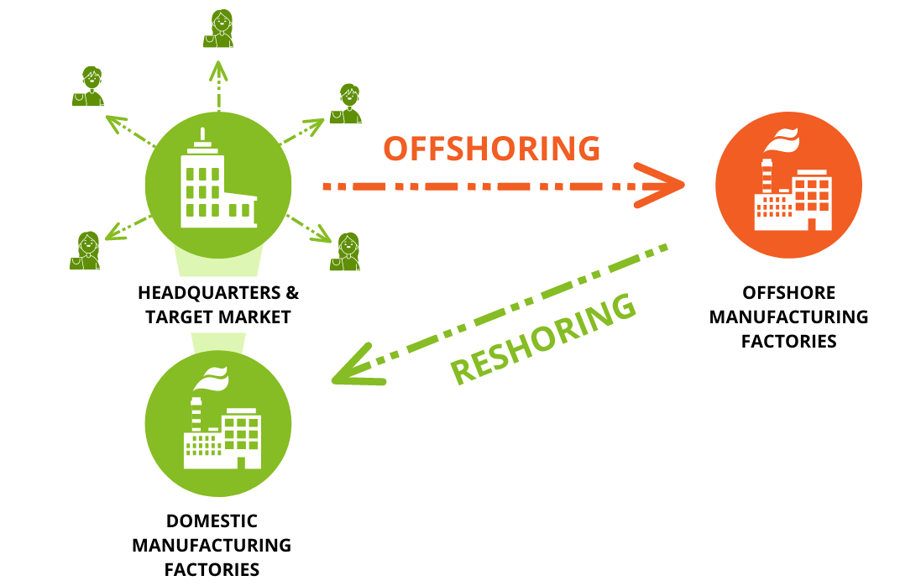
Because offshoring increasingly entails risks and is becoming less cost-effective, the phenomenon of reshoring is becoming a trend strategy in recent times. Many corporates are considering returning their production processes to their home country, reversing the strategy adopted so far.
Electronic industry is one of the most affected by this trend, consequently leading to big changes in the supply chain.
Read the whole article to discover more about reshoring and its advantages, and why many companies are moving toward it.
What is reshoring?
Reshoring is the opposite of offshoring, which is the process of shifting the production of goods that will be consumed at home to low-cost locations, usually where the labor force and the manufacturing is cheaper. On the contrary, reshoring is the process of moving back the production and manufacturing of products from a foreign country back to the home country of the company, or at least closer to it. Reshoring is also known as onshoring, inshoring, or backshoring.
For decades, offshore manufacturing has been a key aspect of the international economy and many European companies located their manufacturing sites in China, India, South Korea, Taiwan, Malaysia, Vietnam, and other countries with lower costs of labor. The electronic industry was and is still one of the most affected industries by offshoring production, where companies in different electronic sectors, such as in the automotive, consumer devices and aerospace industry, shifted their production processes mainly in China, Taiwan, and South Korea.
But in recent times, surprisingly, many companies seem to be changing course.

Why corporates are reshoring their production processes
In the last few years, offshore transport expenses have seen an important increase, mostly due to the trade war between China and the US, an economic conflict resulting from extreme protectionism in which states raise or create tariffs or other trade barriers against each other in response to trade barriers created by the other party. At the same time, the ongoing shift towards automation and the ever-rising customer expectations for shorter lead times are severly impacting European and US companies’ attitude toward supply chain risks.
In addition to this, offshore manufacturing has seen exponential supply chain disruptions due to temporary shutdowns caused by the COVID-19 pandemic, creating important issues in the global flow of goods and services. Meanwhile, the pandemic also generated an unprecedented spike in demand of electronic devices to face social distancing mandates, leading the electronic industry even more into a global chip shortage.
All these issues have made companies vulnerable to major disruption and powerless to mitigate it because of being at the mercy of far away facilities. This is increasingly making offshoring less financially profitable for vendors and manufacturers in the electronic industry. With this in mind, it’s no surprise that many corporates and SMEs have acknowledged this change and have started to change their supply channels, by moving back to homeland their production processes or at least diversifying their manufacturing capacity.
In addition, many countries are engaging in acceleration processes to support reshoring in the microelectronics sectors. For instance, the European Commission launched the European Chips Act to reinforce EU’s security of supply, resilience and competitiveness in semiconductor technologies and applications and to lower its dependence on Taiwan and the other Asian giants. With the new European Chips Act of 43 billion Euro in public and private money, Europe wants to push its semiconductor production from 10% of today's world market share to 20% by 2030.
Opportunities of reshoring
Reshoring might seem to have many challenges in terms of investments, costs and still not outweighing benefits of offshoring, but this can reveal itself not being true. Here's the many opportunities and advantages that reshoring entails:

LOWER SHIPPING COSTS
Reshoring offer lower shipping costs due to the reduced distribution distances and the fees involved in customs from overseas which do not occur anymore. Moreover, within a limited area there are often many shipping options, allowing companies to select the most cost-effectiveness for their needs.

SHORTER LEAD TIMES
In addition to shorter lead times, domestic manufacturing operations allow shorter lead times as well, facilitating the sales, processes, and offering smoother and more responsive customer services.
.png?width=153&name=25%20-%20Copia%20(2).png)
LESS ENVIRONMENTAL IMPACT
As the distance between the manufacturing facility and the final destination is shorter, the energy consumption of logistics per product is much lower, resulting in a smaller carbon footprint..png?width=153&name=25%20-%20Copia%20(3).png)
LESS SUPPLY CHAIN RISKS
Domestic manufacturing can simplify the distribution process, mitigating the shipping risk of damage, loss or delays. Also, it allows to have greater control of the production process and no longer being at the mercy of far away plants in ensuring products to meet your standards.

EASIER COMMUNICATION
One of the critical aspects to smooth operations is communication. While English is commonly spoken in most oversea countries, the depth and degree of understanding might be very restricted. Miscommunication with the partner facility and its employees can result in manufacturing issues.
INCREASED VALUE OF GOODS
Domestic manufacturing could also offer the opportunity to improve the quality of products, to increase the desirability of your brand, by focusing on values and closeness to customer requests. Furthermore, there is the chance to enhance global competitiveness enhancing local innovation.
.png?width=153&name=26%20-%20Copia%20(2).png)
LOCAL ECONOMY STRENGHTENING
Reshoring can also strengthen the home economy, by creating manufacturing jobs, reducing unemployment, and helping balance trade deficits.
Given the many opportunities and the increasingly less profitable conditions of offshoring, many corporates are reshoring their production or are considering doing it in the next future.
Hemargroup as strategic partner to mitigate offshore risks
Despite the many opportunities, reshoring does not always have positive results for the companies involved. A reshoring of the production processes requires high costs and a strategic and meticulous logistical planning. Thus, if the process of transition is poorly managed, or the external conditions are not favorable to a smooth shift, reshoring efforts can fail or cause severe issues to the company. This mainly occurs when a company wants to relocate the production by building its own facilities in the home country and setting up new supply chains completely. Another disadvantage is the time required to build new plants and to find a huge number of workers with the proficiency to perform the job, to avoid deleterious quality deficits.
Because of these challenges and risks, you might want to consider setting up manufacturing agreements with third-party partners in the home country or at least in the near ones. Another possibility to mitigate risks of offshoring but without completely reversing the supply chain could be adopting a dual-sourcing approach, keeping open the lines of communication with offshore facilities but also introducing manufacturing sites closer to the home country.
Selecting the right manufacturing partner close to your homeland is a key step. Hemargroup is an international EMS company based in Switzerland with 50 years of experience in contract electronic design, prototyping, production, industrialization, and manufacturing, up to mass scale, of electronic components and end products in the energy, Smart home and buildings, IoT, sensors and consumer electronics industries. Being in the center Europe and able to provide a valuable Swiss made trademark, it makes us a strategic and valuable partner for the manufacturing of electronic products. Since 1972, we partner with many corporates and SMEs in the development of all the electronics and mechanics of their projects and products, always focusing in achieving the maximum optimization of the final product, with high swiss-made quality. As Hemargroup, we are certified ISO9001 for quality management, ISO14001 for environmental management, AQAP 2110 for development and production of military devices, and ISO 13485 for medical appliances.
Current industry issues due to the ongoing microchip shortage, to the pandemic disruptions and to the current critical geopolitical situation put in real danger businesses operating in the tech industry and we are currently helping many corporates in mitigating such risks. From the design to the industrialization and production stages, our experts work to provide the best procurement and component management strategy. We have a stable stock of electronics components, and our production is Industry 5.0 ready, fully traceable up to the single component and process. Our production services include a dedicated site to check current production phase of our customer orders and a custom smart prioritization option, where our customer can immediately change their orders priority to follow their demand.
Are you an European company operating in the electronic industry and are you looking to mitigate offshoring risks?
Don't hesitate to contact us for more information or for requesting a quotation on our services.
.png)
